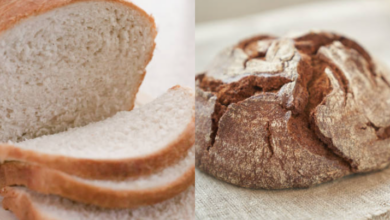Uncover The Mystery: Why Does White Bread Make Me Bloated?
What To Know
- However, the rapid breakdown of starch in white bread can lead to a spike in blood sugar levels, triggering the release of insulin.
- White bread contains a moderate amount of FODMAPs, which can contribute to bloating and other digestive symptoms in sensitive individuals.
- White bread is more rapidly digested than whole-grain bread, leading to a spike in blood sugar levels and excessive insulin release, which can slow down digestion and cause bloating.
Indulging in a fluffy slice of white bread is a simple pleasure that can often leave you feeling bloated and uncomfortable. This common digestive issue can stem from several factors related to the composition and digestion of white bread. In this comprehensive guide, we will delve into the reasons why white bread can cause bloating and explore strategies to mitigate this discomfort.
The Role of Carbohydrates in White Bread
White bread is a refined carbohydrate, meaning it has undergone processing to remove the bran and germ, leaving behind primarily starch. Starch is a complex carbohydrate broken down into simpler sugars during digestion, providing the body with energy. However, the rapid breakdown of starch in white bread can lead to a spike in blood sugar levels, triggering the release of insulin.
Insulin and Bloating
Insulin is a hormone that helps regulate blood sugar levels by allowing glucose to enter cells for energy production. However, excessive insulin release can slow down digestion, particularly in the small intestine. This slowdown can lead to the accumulation of undigested carbohydrates in the digestive tract, resulting in bloating and gas production.
FODMAPs and White Bread
Fermentable Oligosaccharides, Disaccharides, Monosaccharides, and Polyols (FODMAPs) are a group of short-chain carbohydrates that are poorly absorbed by the small intestine. White bread contains a moderate amount of FODMAPs, which can contribute to bloating and other digestive symptoms in sensitive individuals.
Gluten Intolerance and White Bread
Gluten is a protein found in wheat, barley, and rye. While most people can tolerate gluten without issue, some individuals may have celiac disease or gluten sensitivity. These conditions can trigger an immune response when gluten is ingested, leading to inflammation and digestive problems, including bloating.
Other Factors Contributing to Bloating
In addition to the aforementioned factors, other potential contributors to bloating after consuming white bread include:
- Air swallowing: Eating quickly or chewing gum can lead to swallowing excess air, which can accumulate in the digestive tract and cause bloating.
- Carbonation: White bread often contains small amounts of yeast, which can produce carbon dioxide during digestion, contributing to bloating.
- Fiber deficiency: White bread is low in fiber, which can slow down digestion and prevent constipation. Fiber helps to bind water and promote regular bowel movements, reducing the likelihood of bloating.
Mitigating Bloating from White Bread
If you experience bloating after eating white bread, there are several strategies you can implement to reduce discomfort:
- Choose whole-grain bread: Whole-grain bread contains more fiber, which can slow down digestion and reduce bloating.
- Eat slowly and mindfully: Take your time when eating and avoid multitasking. This allows you to chew your food thoroughly, reducing air swallowing.
- Avoid carbonated beverages: Carbonated drinks can contribute to bloating. Opt for water or non-carbonated beverages instead.
- Consider FODMAP restriction: If you suspect FODMAPs may be a trigger, consult with a healthcare professional to discuss a low-FODMAP diet.
- Rule out gluten intolerance: If you experience persistent bloating after eating white bread, consider getting tested for celiac disease or gluten sensitivity.
Summary: Understanding and Managing Bloating from White Bread
Bloating after consuming white bread can be a common and frustrating issue. By understanding the underlying factors contributing to this discomfort, such as the rapid breakdown of carbohydrates, insulin release, FODMAPs, and gluten intolerance, you can develop strategies to mitigate bloating and enjoy your favorite foods without digestive distress.
Questions We Hear a Lot
Q: Why does white bread make me feel bloated but not whole-grain bread?
A: White bread is more rapidly digested than whole-grain bread, leading to a spike in blood sugar levels and excessive insulin release, which can slow down digestion and cause bloating. Whole-grain bread contains more fiber, which helps to slow down digestion and prevent bloating.
Q: Can I eat white bread if I have celiac disease or gluten sensitivity?
A: No, individuals with celiac disease or gluten sensitivity should avoid consuming white bread or any other gluten-containing products. Gluten can trigger an immune response in these individuals, leading to inflammation and digestive problems.
Q: How can I reduce bloating after eating white bread?
A: To reduce bloating after eating white bread, consider choosing whole-grain bread, eating slowly and mindfully, avoiding carbonated beverages, and consulting with a healthcare professional about a low-FODMAP diet or gluten intolerance testing if necessary.
